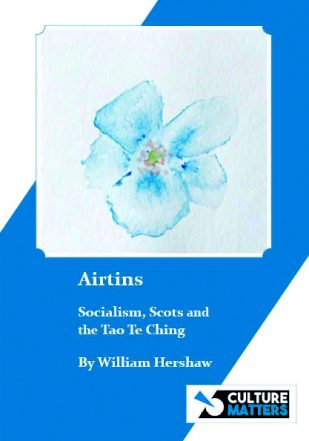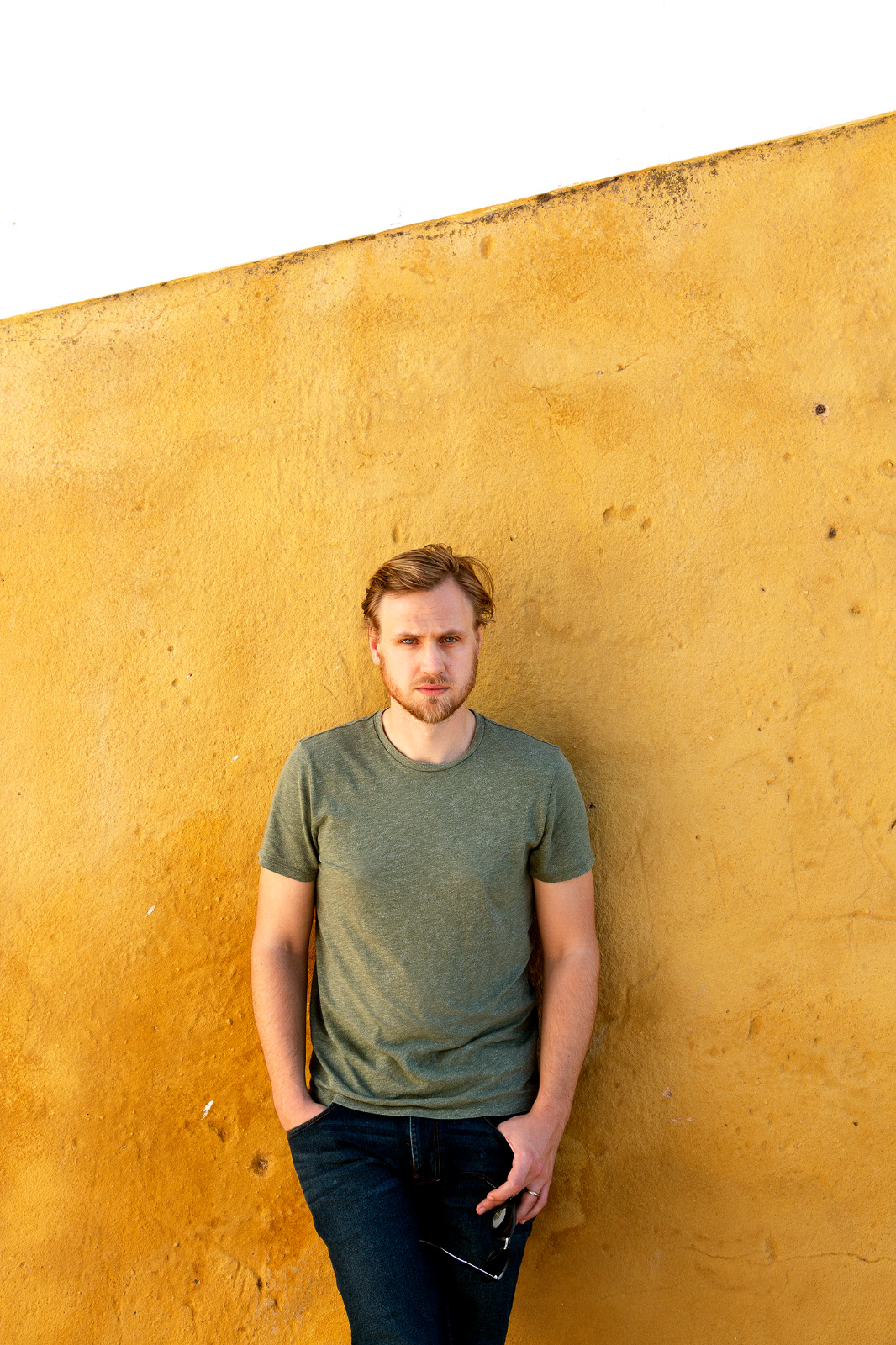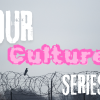
By Jim Aitken
Of that great quartet of ancient Chinese thinkers – Lao Tzu (604 – 517 BC), Confucius (551 – 479 BC), Mencius (372 – 289 BC) and Chuang Tzu (369 – 286BC)– it is to Lao Tzu that Willie Hershaw has turned to inspire his new poetry collection Airtins (published by Culture Matters).
Confucius did meet the aged Lao Tzu and struggled to understand how the old sage did not believe that group action would not improve society. Lao Tzu believed that only withdrawal from society could help promote greater wellbeing. He had served the corrupt and decadent Chou dynasty and withdrew his services from it, searching instead to understand the Tao, the way to be. His work was collected under the title of the Tao Te Ching.
This text became a countercultural favourite during the 1960s when the youth movement of the time decided to drop out and turn on. Yet the hippies of the period also played a significant part in opposing the Vietnam war. Placing flowers in the barrels of guns being held by sturdy GIs is a lasting image of peaceful resistance from that time. Lao Tzu would certainly have approved of those tactics, for he believed in the power of passive resistance.
He also believed that mankind should be permitted to grow silently like plants. His brand of oriental wisdom and humility was not one of weakness but of strength. For Lao Tzu nothing was more flexible and softer than water, and in Airtins this theme is taken up by Willie Hershaw as he sprinkles the collection with images of running water that acts like a life-force, a sacred element nurturing the collection. Above all, Lao Tzu believed that to be rigid is the way of death and that the way of life must be supple and soft. It was the Chinese writer Lin Yutang who said,’ If there is one book that can claim to interpret for us the spirit of the Orient – it is the Tao Te Ching.’
Late capitalist chaos and alienation
Hershaw has set himself a huge challenge to come near to Lao Tzu’s specific outlook in our age of late capitalist chaos and high-tech alienation. Not only that but Hershaw has set out to accomplish his task through the medium of Scots. It is a challenge that he meets and surpasses as his use of the Scots language seems to capture not only the essence of the old master but also reveals the high art that Scots can create in its own right. This is an incredible achievement.
Airtins is not simply a withdrawal from the world because Hershaw also detects in Lao Tzu a practical socialism, a green socialism and a cultural and spiritual socialism. It is a fully engaged poetry collection seeking a better world where nature and man can live peaceably and harmoniously. In this real sense Airtins is an antidote to our world of ever more exploitation and extraction from both ourselves and our planet.
Hershaw has been a great campaigner for the Scots language, his mither tongue. He is the current editor of Lallans, the journal of the Scots Leid (language) Association. He tells us in the 2021 census some two and a half million Scots use and understand Scots. The language has an interesting history and pedigree achieving high levels of artistic creation in pre-Union days with writers like Henryson and Dunbar, Douglas and Lindsay. Since Union it is a language, along with Gaelic, that has been attacked. Scottish school children were once belted for using Gaelic and Scots in the playground. They had to be made fit for the new reality of both Union and imperial expansion and there would be no place for Gaelic or Scots in this new world.
Burns, of course, under the influence of Robert Fergusson, had enormous success with his poems ‘chiefly in the Scots dialect.’ These poems came out as Scotland was now well integrated into this new polity but the language of Scots also seemed to define a sense of the particular nature of still being Scottish. Just as we would define the upper classes by their Received Pronunciation, Scots have always been able to define themselves by the sound of their voice. For Hershaw Scots is not only the ‘vyce o the fowk’, it is an anti-establishment tongue, a rebel tongue well suited to taking on hypocrisy, injustice and tyranny. It is entirely democratic in that sense.
But that’s not all. Scots as a language can achieve high art. It is a language suited to expressing powerful thought and emotion, love and spirituality. It can deal in lofty issues as well as being outspoken. It clearly has enormous range.
And Willie Hershaw’s Airtins reveals all this. The collection is in four parts. The first section is a series of translations, or owersettins, by Willie of poems from the Tao Te Ching. The second part is a series of poems written by Willie under the influence of Lao Tzu. The third part is a further owersettin of shorter epigrams of Lao Tzu, and the final section again reveals Hershaw’s debt to the Old Master, but more particularly as he writes within a specifically Scottish context.
The collection is beautifully illustrated with flowers, drawn by Mary Hershaw. Each section is opened with a delicately rendered flower – snowdrop, Scottish primrose, dandelion and rosehip – while the cover is of the Himalayan Blue Poppy, grown in their allotment in Lochgelly in Fife. The artistry of the collection is designed to take us into a more tranquil environment, one that has not only an oriental mood but also has what Stevenson called ‘a Scottish accent of mind.’
In the poem The Puir Fowk, Hershaw takes us into a world that is still with us:
The puir fowk are stervan,
the rich fowk forder,
glunchin their hairst
o the puir fowk’s darg.
There are glossaries at the end of the poems to help understanding but in this verse we hear that the poor are starving as the rich flourish (forder). They gulp down the harvest of the poor folk’s hard graft. This was true during the Chou dynasty and it is equally true today. The prism of Scots enables such an old truth to be understood equally today.
Similarly in the poem War we have the lines –
Merchants mak profit
fae murderin graith.
In all the wars besetting our world today – Gaza, Ukraine, Sudan, Haiti – enormous profits are being made by arms manufacturers selling their weapons (graith). The Scots used in these lines captures well the horror show going on in the world. There is an obvious revulsion in the word ‘murderin’ and it links well with the word ‘merchants’ in the previous line, offering not only an alliterative feel but it cleverly exposes arms manufacturers as simply one set of merchants among many others seeking profits with absolutely no sense of any morality.
In the poem Feirs, the Scots word for friends, Hershaw writes of ‘a collogue o daffodils are bletharan’. The daffodils are gathered together in imaginary, silent conversation ‘corrieneukin by the roadside.’ The word ‘corrieneukin’ is incredibly expressive and has a sensational sound. It means to speak intensely or intimately and it gives the idea of Nature that is fully alive around us. We are part of Nature and should be alive to it ourselves in order to make ourselves more fully alive. Yes, ‘corrieneukin’ is anthropomorphic but its use begs the obvious question – should humanity not be corrieneukin as daffodils seem to be?
There is a lovely touch of humour and irony in the title poem Airtins. Loosely, ‘airtins’ means directions and Hershaw tells us:
Maist days I’m neir -contentit:
a gangrel fuit gaein naewhur:
dinna speir me for directions.
While readers could well expect some direction from a collection entitled Directions, you will be disappointed here. Hershaw as Lao Tzu tells us most of the time he is a fairly contented soul, seeing himself as a wanderer through life. He is a latter-day Chuck Berry with no particular place to go and asking him for physical or spiritual direction would be pointless. Such a comment, of course, is exactly in keeping with the primacy simply given to being rather than doing. To simply be is what is key, or as Van Morrison once specified, ‘No Guru, No Method, No Teacher.’
We can get this sense of less is best in the poem Mair Anent The Wey. The way is the way of the Tao that tells us to be still and simply to be. But where are we on any road to greater being? Hershaw confesses –
I daunder airtless
tae find siccar groun,
as the snail skails its glit
I gae slidderan roun.
Clearly, he is directionless and unable to find secure metaphysical footing, comparing his spiritual attempt to that of a snail sliding around. This is self-deprecation but also honesty and this blend of insight is followed with the conclusion:
I’m sae faur aff the Wey
yet there’s faurther tae faa:
I jalouse the wyce wale
was no stertin ataa.
In these lines there is not only the recognition that there has been no greater level in being having been attained but he realises that there are levels below where the poet actually finds himself existentially. He has clearly attained some sort of level of significant being yet he muses that he suspects the best call would probably have been not to be searching at all. Again, this is a self-deprecating comment though an honest one. There is no great claim being made for spiritual development and you are left with a sense of simply accepting your right to be but to be without demands on others or on the planet. This is the essence of spiritual socialism. Why must we seek more than what already sustains us?
Yet there is a danger here. Hershaw is offering us Taoist insight and doing so through the use of Scots. The danger here is that the Taoism can become Calvinist in temper when couched in Scots. MacDiarmid, the atheist who peppered his poems with Biblical references, wrote an early lyric in Scots called Wheesht, Wheesht and in the second verse he writes:
It’s guid tae see her lie
Sae snod an’ cool ,
A lust o’ lovin by –
Wheesht, wheesht, ye fule!
The last line here implies awkwardness with heightened emotion and desire. The cry of wheesht meaning be quiet, calm down, is repressive, backward and Calvinist in temper. Even in Scotland today when most Scots profess no religious faith there is still an atmosphere of not getting too much above yourself, of minding who you are. And even if you are not Calvinist whether that means you are Catholic, Muslim, Sikh or follow some new age religious variant or no path whatsoever, you must still never get too above yourself. This is the danger point of Taoism seen through the lens of Scots when applied to the spiritual rungs on the ladder of self- development and realisation.
The customary question at home and in school, ’who do you think you are?’ still holds true throughout secular Scotland today, and contained within such a question is a clear hindrance to any self-determination either for the individual or for nation. Hershaw’s honest sense of where he may be spiritually can so easily be mistaken for Calvinist nay-saying, when Hershaw actually seeks to say aye to the Taoist way of being.
Taoism on the Scottish rocks
However, when applied to a Fat Seal on a Rock at Leven Beach, the effect is totally different. In a wonderful opening line, the seal is addressed as ‘Beer-bellied Archimedes in a camel coat.’ Later the seal becomes ‘Sonsie blate-whuskert Buddha’, oblivious to the entire business of creation and being. The seal is a seal and accepts totally what it is. There is no posture of character or personality, no pretension to be other than what it is. The seal simply concentrates its ‘sea-mantra/ wi nae need tae tak a tummel tae yersel.’ The seal needs no guru, no method or teacher to find its way. It is its own way. It is the pure unaccommodated being unburdened by the need to find its soul. It is what Lacan would call the Real.
This poem gives us Taoism on the Scottish rocks. The seal is to be envied for it is what it is while we seek to perpetually be, never uncovering what we truly are or even were. It is a brilliantly observed poem and one that comes close to the spirit of the Taoist way. Nature must be our guide and the Fat Seal on a Rock at Leven Beach is there to aid us on our way.
As a standalone poem it is quite brilliant in what it tries to suggest and imply. However, there is also what Nietzsche called the awful ‘all too human’ element that can even intrude here to question – what happens to the seal if we have either caught all the fish it depends upon in order to be a fat seal, or the waters it swims in becomes polluted by human action?
From a seal on a rock to an ammonite picked up at home. This object, we are told in Address tae an Ammonite, was once something with being, with life, some one hundred and forty million years ago. The poet muses that for this object ‘chynge birls gey slaw… ‘Though inanimate, it possesses a quality of the seal in having been what it once was. It has only ever been an ammonite in both its being and non-being.
However, the poet uses ellipsis after the word ‘slaw’ to change the direction of the poem. It turns out that this ammonite was once bought by the poet’s son as ‘A souvenir fae Whitby.’ The son, named as ‘our Andrew’, had brought the object home as his father holds it among the few other objects Andrew left behind. His death makes the father think of the span of his passing as he holds the ammonite with its timeless quality. In a delicate and deft touch at the end the poet calls the ammonite ‘Ancient charm’ while adding ‘though ye last as lang again I still will grieve.’
As readers we should feel privileged to be told this tale of the ammonite and the associations it holds for the poet. There is a strong emotional and spiritual honesty here and enabling the reader to share in this is actually a form of healing. To talk rather than repress is always best. That way lies understanding and acceptance. Having such a poem included in the collection also shows a Taoist awareness about what cannot be changed, and the use of the ammonite reminds us all of our own finitude within a universe that, according to Hume, is as indifferent to our lives as it is to the life of an oyster.
A spiritual honesty, at peace with the world
The claim that Scots can be a language of expansive thought is shown throughout the collection. In some poems it can be clearer than in others. In the poem Dout, meaning ‘doubt’, we are taken into our own world of binary certainties. Trump can only ever be right and his acolytes possess the same certainties. But for Hershaw, ‘Certainty’s eyedent tae prise the button/Detonate the rucksack’ or ‘Tak an aix tae the ancient plain tree.’ For Hershaw though,’Dout is an airtin tae empathy’, it is ‘a hauf-wey house’ from ‘the curse/ O aye being richt.’
Again, we see in these comments a spiritual honesty rooted in a way of being that is at peace with others and with the world. Yes, Scots can clearly be a vehicle for such profundity. It is there in abundance in a series of owersettins from the epigrams of Lao Tzu. Take, for instance, the lines
Time is a creatit thing:
‘I dinnae hae time,’ means ye cannae be bothert.
In an economic system that demands more and more from us, it is unacceptable not to find time for others or for ourselves. In a similar way to our redistribution of time, we should also redistribute our capital:
A wyce man daesnae hoard his siller.
The mair he gies awaa the mair treisure he stowes.
Our age is one of untrammelled greed and selfishness at the top and a dog fight at the bottom. Politics needs to return to the idea of service, of aiding those who need and doing so with a sense of humility. Top-down politics has betrayed the masses and what should happen is to be one who listens and leads from behind the people, taking in all their concerns:
Tae be a leader walk ahint fowk.
Philip Larkin, in a classic understatement, once said, ‘Lives are good for you.’ They are precious and fragile and the duty of life is to open up to it at all time. Accentuating the positive nature of being here is essential to grasp life in all its immensity and wonder:
There is a time tae live and a time tae dee
but never a time tae naesay the moment.
In the poem This was never the Leid o Dunbar and Burns, the poet is standing in some queue, possibly in a butcher shop. He listens to a conversation taking place between a customer in front of him with the butcher. The poem captures the conversation that has taken place in Scots. It is a Scots of Fife folk and has no pretensions to be the Scots of Dunbar or Burns. Just as Shakespeare had hoped to get his audiences to rise to the challenge of his poetic prose, MacDiarmid once aspired his nation to get back to the Scots of Dunbar or Burns. In reality there are many variants of Scots spoken throughout Scotland, and Hershaw is simply recording the Scots voices he hears in his own locality:
Aye, aye, neebs – hou’s it gaun?
Ye see it aa – I’m hingan on by a thread.
The butcher is having a tough time as two of his staff are ‘aff wi the lurgie.’ The shop is busy with customers and he has to work trebly hard to cater to them all. It is tiring, for sure. They talk about the customer’s order, holidays, the weather and then the customer asks the butcher what time he will finish – ‘sae whit time is it that ye get loused? It will not be ‘till the back o fower.’ As a comment signifying sympathy with the butcher’s hard work today, the customer endearingly says to him to take it easy – ‘Tak it cannie.’
The butcher gives the final comment by replying, ‘Aye Sur – It’ll aa be the same in a hunner year.’ Embedded in this comment is the realisation of the Taoist way, of the finitude of our lives set against the immensity of time itself. Clearly, this butcher has held the ancient charm of the ammonite. He knows his life is but a passing thing and in a hundred years both his shop and his life will be nothing more than memories, or what Walter Benjamin called ‘fragments of a life.’
Hershaw writes and lives from his ‘hamelt airt in Fife.’ It is a Fife that looks out the way, to ancient Chinese thought for inspiration. It is aware of how the world is in a general sense but in a more particular sense this ‘airt in Fife’ resides within a Scotland that is now over ten years on from an independence referendum. Scottish self-determination is of as much concern to the poet as his own spiritual condition.
Britain – a state drowning in tradition
In the poem The People’s Leaders, Willie regrets the demise of Jeremy Corbyn – ‘This corbie never got the big cheese’ because ‘his ain pairty… shot him doun.’ And the new leader, of course, is the disastrous Starmer who has moved the Labour Party to the far right as:
The pensioners shiver.
Democracy? A Scottish referendum?
This red Tory’s haein nane o that.
Scotland will not have self-determination and will continue to be fleeced of her natural resources, her oil and gas and renewables, whisky and livestock and the rest. Scotland is a rich country full of poor people. It remains part of a polity that stews in its post-imperial pretensions that delivered Brexit and has now morphed into xenophobia and nativism. Why would any Scot not want to get out of such a state?
And in the poem Reporting Scotland, first published in the Scottish poetry anthology A Kist of Thistles, also published by Culture Matters, Willie gives a clear insight into what passes for news about Scotland. Reporting Scotland is the name of a TV news programme that comes after the main BBC news each day. Hershaw uses the name to represent more generally what the media comments on Scotland. It has become obvious to many how the constant attacks in the press and on TV on all things Scottish has continued apace since the referendum of 2014. The SNP must be demonised, seen as backward, dangerous and generally useless. They must, goes the argument, be booted out to make way for Labour, the natural rulers, or even the Tories or Reform. Anything but the SNP.
While the SNP are culpable politically and economically, they retain support in Scotland primarily because they are not a far-right Party like the Tories, Reform or now Labour. They are seen by many as the least-worse option. Scotland, it should be pointed out, last voted Tory in 1955. Both Empire and traditional industry have gone and Scotland did not vote to leave Europe. It is England that gave us Brexit, gives us Tory governments and right-wing Labour governments, granted with a smattering of Scots in them.
In a post-imperial state that doggedly retains its imperial pretensions through an archaic honours system and through possession of nuclear weapons, alongside playing poodle to whoever inhabits the White House, Britain seems unable to march towards modernity. It is a state drowning itself in tradition and custom with no written constitution and no desire to teach her multicultural children about the brutalities of Empire.
Scotland, it seems, must be kept in check by being seen as an awful place. Hershaw writes of the ‘Endless leet o negatives and naysays’ in our media. It is a country of ‘murder, rapes, drugs, daith/mishanter, mislippens, failure.’ The distrust (mislippens) and general bad fortune (mishanter) is all down to the SNP, of course. This is not the country Hershaw recognises and he is fully aware why Scotland continues to be given a bad press:
You hae the affront tae presume tae edit our day,
let naethin hertsome or byous be celebratit …
You ettle tae unpick the gowden threids
fae our byordinair bricht tapestry
tae sairve your maister’s cause.
At the end of the poem he imagines, ‘The auld wolf has been seen again/ smoulin ben the wuids.’ The wolf represents the rebel nature of the nation. It will continue to be what it is, both wild, free and defiant.
Scotland, for Hershaw, shares the Flag o a Deean Empire with ‘England tae the fore, Scotland shoved ahint’, with Ireland ‘made tae thole (put up with)’ and ‘Wales no there.’ This is the Union, ‘sellin a fause union.’ The union flag is possessed of the ‘imperial stamp o conquest, vauntit /by the faur Right, xenophobes, slavers/racists, supremists, immigrant haters.’
And sadly, Sergeant Jock has traditionally been part of this horror show ‘aye pushing the braund.’ It is a flag that represents:
Bluidy Sundays, barren rocks,
Falklands, Kabul, Culloden;
outsourcing tae Rwanda nou.
The sentiments expressed here have much in common with Hamish Henderson’s great song Freedom, Come All Ye. Henderson laments how his nation’s people have been used for one imperial exploit after another. He wants Scotland to break free from this. He wants Scotland ‘nae mair’ to be cursed by our complicity in imperial outrages. He invokes the name of John Maclean, the revolutionary Scottish socialist who sought for Scotland over a hundred years ago to break free from the brutalities and class-ridden nature of Union. Hershaw also shares these sentiments today.
Aqueous socialism
Which brings us now to water. The collection uses a great deal of water throughout as both a symbol of healing, of purity, of the sacred. Water has a special place in all the world’s religions. Without it we simply cannot be. But water can also represent unity. Water is what it is. It can represent a levelling for all. It is something that reaches down, down below and in this sense, it is for all.
Hershaw in Rinnan Water tells us about ‘The cheap Chinese fountain’ he bought in some garden centre and brought home to his own garden. Its ‘cheery bubble aye blethers styte tae me’, offering the poet a salve and a balm from the world that seems to be imploding around him. The trickling sound of water from the fibreglass fountain acts to ‘droun out the onding o Daurk.’
This is Taoism in action. It cannot function without the replenishing sounds and tastes of water. In the collection’s final poem called Abhainn, Pairt Twaa – abhainn being the Gaelic word for river – we have poetry as a river or rivers of words. The rivers run free just as Hershaw’s words do too. They pour down in torrents and at their core they exist:
Tae be life
tae gie life
sing we
This poem is about the power to heal, to replenish and make anew. The poem is also a celebration of both water and language. The words pour down the page like rivers in spate. The water they hold is the great leveller for everyone. Water is an equal thing that comes as one. In a series of pieces on Scotland’s rivers, Hershaw offers a torrent of words to describe parts of our rivers as they make their way either to ocean or loch. Here is a small part of the River Tay, Scotland’s longest river:
earn, faeg, water of may,
Ruthven, machany, shaggie burn,
Turret burn, lednock, water of ruchill,
Burn of ample, kendrum,
Alt srath a’ ghinne,
Almond, shochie, ordie, isla,
Ericht, lunan, lornty, shee…
The richness of the language acts to call out the greatness of our healing water for all but also to create how wondrous our language is in being able to name all these parts of our rivers. Our language defines us as much as our rivers do. There can be nothing backward or small in a nation that can use so many words to describe so many courses of our rivers.
Hershaw writes down these outpourings of water for all our rivers and the effect is overpowering just like water can be. Water is indeed the great leveller, the great equaliser. These lines in this final poem give a kind of aqueous socialism splashing the reader with the spray from Hershaw’s words. Water, like socialism, should be for all. Its properties can heal, mend and create the real growth in our human family realising they are part of Nature and not separate from it. It is an incredible achievement. And, yes, it is in keeping with the Taoist way which seeks to cleanse, renew and glory in being here. Hershaw has pulled off a discernibly Scottish Taoism in the Scots tongue. It is a tongue like the imaginary wolf that refuses to die out. Airtins deserves the fullest exposure it can be given. It is a major achievement.
Airtins: Socialism, Scots and the Tao Te Ching, by Willie Hershaw, is available here.















